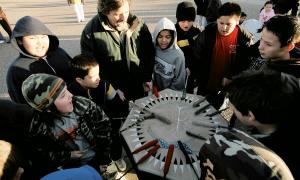article
3,356 Results
teaching strategy
Close and Critical Reading
Agree/Disagree Statements
Agree/disagree statements challenge students to think critically about their knowledge of a topic, theme or text. The strategy exposes students to the major ideas in a text before reading—engaging their thinking and motivating them to learn more. It also requires them to reconsider their original thinking after reading the text and to use textual evidence to support and explain their thinking.
July 19, 2014
student task
Do Something
Community Spotlight Cards
Students create “trading cards” spotlighting diverse community members who work toward social justice goals that connect to themes from the central text.
July 13, 2014
article
Learning Lakota

For a high school on South Dakota's Rosebud Reservation, culturally responsive curriculum may be the best antidote to the violence, poverty and growing cultural disconnect hindering student success.
student task
Do Something
Buddy Share
Students choose a mode of expression—e.g., writing, art or storytelling—to share theme-related ideas and feelings with a “buddy” from outside the classroom.
July 13, 2014
article
Advice From the Experts
TT answers your tough questions! This time, how to talk about Black Lives Matter in your classroom and how to protect LGBT students.
article
Toolkit for The Gentle Catalyst
As adults and authority figures, teachers have power over their students. This toolkit is an “adult privilege” checklist teachers can use as a self-assessment tool to help them think about their own privilege in the classroom.
student task
Do Something
Spotlight on Change Agents
Students investigate, interview and profile a person working for equity and social change. The person can work on the local, national or international level, with an organization or as an individual. The compiled profiles will form a resource for other students in the future.
July 13, 2014
teaching strategy
Community Inquiry
Critical Listening Guide
A guide to help students interpret, analyze and evaluate information encountered in a variety of media formats. Use this guide with the spoken and performed texts included in the Perspectives anthology.
July 13, 2014
professional development
Five Standards of Effective Pedagogy
Does your teaching include these five standards? Take a deep dive with this self-check, originally produced by the Center for Research on Education, Diversity and Excellence at the University of California.
May 4, 2011